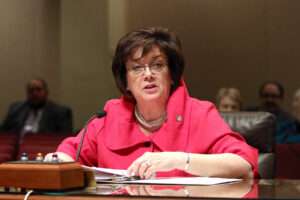By AARON SANDERFORD
Nebraska Examiner
LINCOLN — Nebraskans would have about six weeks to decide on ending a pregnancy, instead of the current 20 weeks, under legislation anti-abortion senators plan to propose this session.

The bill, expected this week, would ban abortions after an ultrasound can detect a fetal heartbeat.
The new proposal would not criminalize either patients seeking abortions or doctors performing them, based on draft language obtained by the Nebraska Examiner and verified by the bill sponsor.
How the bill would work
Doctors, however, would lose their medical licenses if they performed an abortion after an ultrasound finds a heartbeat or if they performed an abortion without the required ultrasound.
The bill would rely on the existing medical licensing structure at the Nebraska Department of Health and Human Services to enforce the law, including review by a panel of medical peers.
Supporters of new restrictions say the language is modeled after what anti-abortion advocates call “heartbeat bills” passed in Iowa, Missouri, Kentucky, Ohio and Georgia, to name some.
Earlier this month, South Carolina’s Supreme Court ruled that a law with similar exceptions to the Nebraska proposal was an unconstitutional breach of privacy.
The Nebraska draft contains exceptions for rape, incest and medical threats to a mother’s life. It spells out protections for in vitro fertilization and procedures after miscarriages.
Mixed public sentiment
State Sen. Joni Albrecht of Thurston, the bill’s sponsor, said Tuesday she would have preferred proposing a full ban with fewer exceptions, like the bill that fell two votes short of passage last year.
But she and other supporters of additional abortion restrictions acknowledged the political reality of recent polling that indicated a majority of Nebraskans favor neither extreme on abortion.
Bold Nebraska polling released by the Nebraska Democratic Party indicated that more than half of Nebraskans oppose an outright abortion ban, and many senators expect fierce opposition to new restrictions.
Polling done for Nebraska Right to Life, the Nebraska Family Alliance and the Nebraska Catholic Conference indicated majority support for restricting abortion after a heartbeat is heard. All three anti-abortion groups support Albrecht’s bill.
“I know that in Nebraska, after bringing the trigger bill that we did, I knew that I had to be open-minded to some movement,” Albrecht said. “I’m listening to Nebraskans.”
Many political observers expected Nebraska to follow other conservative states that have reduced legal abortions from 20 weeks to 15 or 12.
Opponents to fight new restrictions
Abortion-rights advocates have pledged to filibuster any efforts to further restrict, limit or ban a procedure they describe as a private decision between a woman and her doctor.
State Sen. Megan Hunt of Omaha, in a recent interview about the likelihood of new efforts to increase restrictions, warned about the risks of “extreme abortion bans across the country.”
She pointed to states with six-week bans, such as Missouri and Ohio, where she said doctors are afraid of running afoul of the law and are risking lives by refusing to perform abortions.
She called abortion bans “bad for Nebraskans” and said doctors “are being put in situations where they are thinking about legal liability when they should be … treating their patient.”
Those advocating for the six-week ban, including Sandy Danek of Nebraska Right to Life, say they want to reduce the number of abortions in the state as sharply as possible.
“We’ve always focused on the fetal development of the child,” Danek said. “I’m excited about the ‘heartbeat’ bill, because I think it reveals the humanity of the child.”
Governor backs bill
Nebraska Gov. Jim Pillen told the Examiner in a recent interview that he would support any legislative movement toward fewer abortions, up to and including an outright ban. He supports the bill.
The number of abortions performed in Nebraska has trended down since 2000, from a high that year of 4,178 to a low of 1,907 in 2016. The most recent data available, from 2021, was 2,360, according to the State Department of Health and Human Services.
According to DHHS, about 85% of abortions in Nebraska occur after six weeks. Albrecht said that should motivate passage of her proposal.
“I really think (abortion-rights advocates) want women to be able to do what they’ve been able to do the last 50 years,” she said. “We have to stand up and support and protect that unborn child.”
Tax credit for pregnancy support orgs
Albrecht also plans to introduce a bill that would offer a tax credit to individual, group and corporate donors to pregnancy support organizations that do not perform abortions.
These nonprofit groups, which the bill requires to be verified by the Nebraska Department of Revenue as legitimate, provide services that include counseling, diapers and baby formula.
A number of the groups have religious ties and have been accused by abortion-rights advocates of misleading or confusing women into carrying babies to term after seeking an abortion.
The tax credit bill, as written, would cap the annual amount of tax credit available at $10 million. The credit would not be refundable, but it would match a person’s donations in a given year up to 50% of state income tax liability, based on the language the Examiner reviewed.
The bill would require the Revenue Department to compile a list of qualifying pregnancy support organizations.




